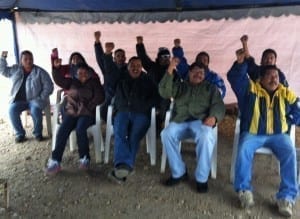Mass Firing of Mexican Union Leaders Leads to Hunger Strike

Workers in Mexico launched a hunger strike for justice at PKC autoparts plants. Credit: Javier Zuniga/Los Mineros
Eleven workers from PKC wire harness plants in Mexico launched a hunger strike yesterday. They were among 122 workers fired by the Finnish autoparts company in mid-December for what they say is retaliation for seeking to form a union. They plan to continue the hunger strike until they are reinstated and their right to trade union freedom is recognized.
The fired workers include 18 members of the executive committee of Local 307 of the National Mineworkers Union (Los Mineros). The union believes the action was in retaliation for their pro-union vote at a rigged representation election in October.
According to Los Mineros, “workers were called individually to the human resources office and told to sign a ‘voluntary’ resignation letter. Officials of the Federal Labor Board were present and encouraged the workers to sign.” The union says workers were told that “the company has decided it no longer needs your services.” Further, the dismissals were distributed across PKC’s five plants and not concentrated in a particular production line, a fact Los Mineros says shows the dismissals cannot be linked to the loss of a client order, which is often given as a reason for mass dismissals.
Ten workers at the plants, located in Ciudad Acuña, did not sign the resignation letters and with the union’s support, have filed legal demands for reinstatement with the Federal Labor Board.
The Border Workers Committee (Comité Fronterizo de Obreras, CFO) and Los Mineros, long-term partners in educating and assisting workers who wish to form independent unions, are working together on the organizing campaign, which has gained global support
Shortly after the company rejected Los Mineros’s request for collective bargaining in 2011, PKC announced that it had signed a contract with a corporate-backed “union,” CTM, to “protect” the company from other union interests. After successful appeals by Los Mineros, the Mexican government authorized the union election, and in October 2012, the union won 2,311 votes.
All Los Mineros’s election observers were among those fired in December. International support—which includes IndustriALL, the metal workers unions in Finland and Sweden, the United Steelworkers (USW), the United Auto Workers (UAW) and the AFL-CIO—has exposed PKC’s efforts to impose a protection union and rig the election and a major Finnish television network ran an exposé on the company’s operations shortly before the corporation’s annual shareholder meeting.
